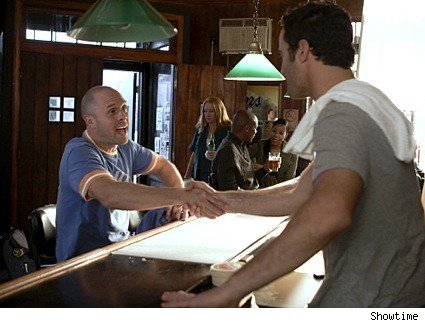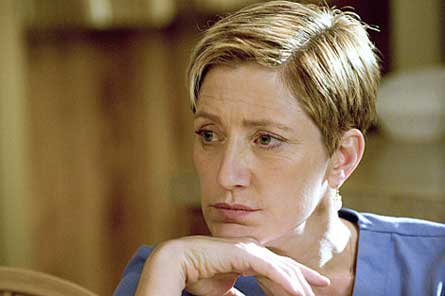A Bitter Pill: Nurse Jackie and a Discourse of Discontent
Janani Subramanian / University of Southern California

Showtime has emerged in the last few years as a serious contender in the premium television league with its super-hits like Dexter, The Tudors, and Weeds challenging HBO’s reign over the “quality” (Emmy-winning, adult-oriented, original) television category. Four of its series – Nurse Jackie, Weeds, United States of Tara, and Secret Diary of a Call Girl – center their narratives around a strong female protagonist who eschews conventional morality for personal or professional gain. Jason Mittell notes that “HBO has built its reputation and subscriber base upon narratively complex shows,” and, in a slightly different vein, Showtime has incorporated the female-centric, single camera, half-hour “dramedy” genre into its quality brand identity.1 Building on its success with the groundbreaking and controversial The L Word, the network has diverged from HBO in its efforts to push the boundaries of gender and sexuality within premium cable.

With the addition of Nurse Jackie, which debuted on June 8, 2009, Showtime enters into another conversation within the television landscape; its middle-aged, working class heroine Jackie Peyton (Edie Falco) joins a growing group of older female protagonists across both network and cable programming. Julia Lesage’s “Watching for Botox” in Volume 11 of Flow TV deftly highlights the contemporary prevalence of plastic surgery for public figures but also perhaps touches on another point – that older female protagonists are becoming more ubiquitous in fictional and nonfictional media narratives.2 Glenn Close in Damages, Julianna Margulies in The Good Wife, Kyra Sedgwick in The Closer – these are a few examples of series focused on middle-aged women who try to negotiate professional success with complex personal lives. While these series highlight these women’s powerful professional profiles in the midst of male-dominated environments, they also tap into what Diane Negra defines as a kind of temporal anxiety that often structures women’s lives. In “Time, Crisis and the New Postfeminist Heterosexual Economy,” Negra argues that the convention of “cheating time” in contemporary media texts is often related to a sense of urgency that dominates the female characters’ lives – in particular, an urgency to complete the requisite “stages” of the conventional heterosexual feminine life, including relationships, marriage and children.3 Along these lines, Close’s Patty Hewes, Margulies’ Alicia Florrick, and Sedgwick’s Brenda Leigh Johnson are represented as having sacrificed or continuing to sacrifice stages of their personal lives for professional achievements, and from week to week, the narrative push behind these dramas is the continuing dissatisfaction of these women with their personal/professional choices. (Just to note, though, that TNT’s The Closer is a throwback to more old-fashioned “whodunit” detective stories, with every case neatly and efficiently tied up by Brenda; the arc that extends from episode to episode is usually focused on Brenda’s recent, “late” marriage to FBI agent Fritz Howard (Jon Tenney).)

As Negra notes, anxiety surrounding aging and the passage of time is largely class-based, as upper middle-class women possess the luxury of choosing to maintain their public images from an entire industry marketed towards reclaiming youth. The heroines of Damages, The Good Wife, and The Closer may be conflicted by their choices, but they are comfortably conflicted within well-paying jobs and nice homes. Lesage argues about Damages, “In this show, most of the characters are upper-middle class, so that the actors’ cosmetically worked-on faces fit well with the narrative’s entrepreneurial psychology, one that neoliberalism now imposes on the managerial class: work on yourself, develop yourself, make good choices, take charge of your life—especially in terms of services you can buy.”4 While not challenging the individualist rhetoric of neoliberal cultural production, Jackie does break the mold as a solidly working class middle-aged woman whose short hair, unmade-up face and plain uniform, strikingly different from Falco’s image in her previous role as Carmela Soprano, signify a marked lack of concern for physical appearance. As the main breadwinner in her household, Jackie shuttles (on public transportation) between work at the hospital and her modest home in Queens, and with husband Kevin (Dominic Fumusa) as part-time bartender and stay-at-home dad, money always appears to be tight.
Yet Jackie’s focus is not on moving up a professional ladder at work or accumulating more money to improve her home life; her simple lifestyle is constantly emphasized next to the ostentatious nature of her best friend Dr. O’Hara (Eve Best), whose extravagance Jackie observes with amusement rather than envy. Her motivations throughout the series are less obvious than those of her more ambitious television peers; she has to work, she dutifully takes care of her family, but she doesn’t seem to like either one very much. While she moves seamlessly between work and home, it’s not because she’s managed to maintain a healthy work-life balance, but more because she appears to be equally fed up with both. It is through Jackie’s ambivalence that I read the show’s groundbreaking representation of a working class, non-consumer-oriented femininity that adds shades of complexity not only to the work-life conflicts that mark other female-centric series, but also to the idea that a woman must move linearly down a particular timeline in order to achieve satisfaction. While female characters in mainstream television and film are often caught between the “either/or” of personal life and work, Jackie appears to choose neither, her deep dissatisfaction with all facets of life evidenced by her ongoing addiction to painkillers. The half-hour series oscillates quickly between episodes of melodrama and comedy in Jackie’s interactions with co-workers and peers, but often pauses for quite a few beats to focus on Jackie’s lined, tired and inscrutable face, suggesting that there are dark dimensions to the character that we have little hope of understanding.

Jackie’s unhappiness does not stem from not caring, though, but quite the opposite. It is a testament to Falco’s acting prowess that she’s able to carry Jackie’s poker-face grimace from home to work while also conveying the deep compassion and affection that Jackie feels for her patients and family. She appears to care equally about her ex-pharmacist lover Eddie (Paul Schulze) – who she seemed to be sleeping with in exchange for painkillers – as she does about her husband, yet there is no time in the show or her life for self-reflection (or voice-over narration, a la Sex and the City) on the moral ramifications of her affair – it just is. Her often unethical nursing practices and ongoing drug addiction are similarly left unquestioned, which has garnered criticism from critics that the show skims the surface of its characters with a “numb detachment.”5 I would argue, though, that Jackie’s ambivalence poses a challenge to viewers to critically consider her motivations in career and personal life and undoes assumptions that her desire must remain confined to either one or the other. The show not only encourages us to rethink the generic codes of the melodrama and the situation comedy but also to reconsider not what the priorities of our female protagonists should be, but rather what they could be.
Image Credits:
1. Nurse Jackie Season 2 Poster
2. Nurse Jackie and Zoey (Merritt Wever)
3. Jackie’s lover (Paul Schulze) meets her husband (Dominic Fumusa)
4. Nurse Jackie (Edie Falco)
Please feel free to comment.
- Jason Mittell, “Narrative Complexity in Contemporary American Television,” The Velvet Light Trap 58 (2006): 29. [↩]
- See Julia Lesage, “Watching for Botox,” Flow TV 11.11 (2010). http://flowjournal.org/?p=4890. [↩]
- Diane Negra, “Time Crisis and the New Postfeminist Heterosexual Economy,” Hetero: Queering Representations of Straightness, Ed. Sean Griffin, Albany: SUNY Press, 2009. 173-190. [↩]
- Lesage, “Watching for Botox.” [↩]
- Cristina Kinon, “Real-life nurses: Pull plug on ‘Jackie’,” NY Daily News, June 8, 2009: http://www.nydailynews.com/entertainment/tv/2009/06/09/2009-06-09_nurses_pull_plug_on_jackie.html.; Brian Lowry, “Nurse Jackie,” Variety, June 7, 2009: http://www.variety.com/review/VE1117940427.html?categoryid=32&cs=1. [↩]
Great column, Janani! I appreciate your analysis of Jackie’s class in relation to some of her television peers. I also enjoyed your reading ostensible “detachment” that you read as a challenge to viewer expectations, and I wonder how that relates to Jackie’s class. Does Nurse Jackie represent a variation on a “silent” working class? Are there other television characters who might also enter into this conversation about detachment and the working classes?
I enjoyed your thoughts on Nurse Jackie, Janani. You’ve turned my irritation with Jackie’s inscrutability into a source of intrigue. I’m hoping that your reading will bear out that the show will somehow link her breathless shuttle between work and family to her drug abuse and we might actually move beyond the witty banter among interesting characters (love Zoey!). I’m surprised that she’d be designated as “working class,” though. Maybe economically, but not in terms of cultural capital, including looks?
Thanks for the great comments, Charlotte and Aniko! I wanted to watch how the season played out before responding and have finally caught up with my DVR. I’d love to hear your thoughts on the season finale.
Charlotte, great question about detachment and the working class. When I think of situation comedies about working class families (Roseanne, Married with Children, King of Queens, The Simpsons, to name just a few), my first thought is that they are generally represented as “unruly,” as Kathleen Rowe describes the character of Roseanne. Their working class status is constantly drawn attention to and is often the basis for disagreements or misunderstandings addressed within the 30-minute time frame. Jackie is different in that she does not call attention to her class, yet it’s visible more subtly in where she lives, how she dresses, the occupation of her spouse, etc. I’m wondering if the silence you are referring to, as opposed to the “loudness” of other shows representing the working classes, is problematic within Nurse Jackie, almost hiding class rather than acknowledging it?
That of course leads into Aniko’s comment, which definitely made me take a closer look at Jackie’s class signifiers while watching. I think you are right that Jackie’s class status is mainly determined by economic factors rather than cultural capital, particularly because of her friendship with Dr. O’Hara (who of course has given Jackie a huge sum of money to send her daughters to private school), a handsome husband, a lover, and a steady supply of pain killers. In terms of looks, I’m still stuck on where Jackie (and Edie Falco) fits into the spectrum of female tv characters. She doesn’t hide her age, yet she is slim and well-coiffed (and I guess we rarely see her in anything but scrubs). I think somehow making Jackie economically working class works in a mainly melodramatic fashion; we know that she’s spending her hard-earned money on pain killers, and ultimately endangering her roles as wife and mother to do so. In that case, her class becomes merely a narrative device rather than encouraging any kind of reflection or commentary on women and class in general. I’m curious to see how Season 3 plays out, now that her “worlds” have come crashing down around her.